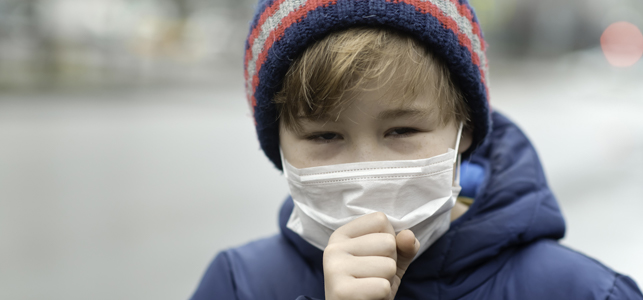
How serious is my child’s cough?
A child’s coughing can be noisy, disruptive and, above all, worrisome. It can also interfere with a good night’s sleep (often for you too). But a cough can also be a sign that things are moving along in terms of clearing the airways.
It’s important to know when a cough is a normal and helpful response to an infection, and when it’s something that needs to be evaluated by a doctor.
Coughs help and protect, but spread germs too
 It’s common to cough with a cold and this helps to remove the cold virus from the airways. However, when a person coughs it allows the virus to spread to other people as droplets in the air. For this reason, it’s important to always cover your cough and try to stay away from people who may be more likely to become sick like very young children, the elderly or those with low immunity if you have a cough. While these are always good practices, we’ve been particularly reminded of their importance amidst COVID-19.
It’s common to cough with a cold and this helps to remove the cold virus from the airways. However, when a person coughs it allows the virus to spread to other people as droplets in the air. For this reason, it’s important to always cover your cough and try to stay away from people who may be more likely to become sick like very young children, the elderly or those with low immunity if you have a cough. While these are always good practices, we’ve been particularly reminded of their importance amidst COVID-19.
The protective value of cough is well known from a health perspective as people with extreme weakness, muscular disease or swallowing difficulties cannot cough strongly enough to protect against developing lung infections like pneumonia. We even have a device, called the CoughAssist, to help people with weak coughs.
Coughs can be triggered by more than colds
We cough in order to expectorate – or “cough out” – stuff from our airway. This includes phlegm and mucus from infection, other things that have gone into the airway instead of the stomach and anything else that can irritate the airway. We have cough receptors throughout the respiratory tract (from the back of the throat all the way to the lower airways and lungs) that trigger a cough when irritated. That’s why things that tickle the back of your throat can cause coughing and gagging. Some people even have a cough receptor in their ear called Henry’s nerve and they may feel the need to cough when cleaning their ears.
Chronic cough may be cause for concern
When a cough lasts for longer than four weeks in children (eight weeks in adults) we call this a chronic cough. There are many causes of chronic cough and usually if a cough lasts long enough to be considered chronic it needs to be evaluated.
What do the different types of coughs mean?
Wet cough or coughing up phlegm – Chronic cough can be due to long-lasting or continually re-occurring infection in the lungs with diseases like cystic fibrosis, or if the respiratory system, immune system or lungs aren’t working properly. The characteristic is a wet cough (produces a wheezing or rattling sound) in younger children or a cough that leads to spitting out phlegm or mucus from the respiratory tract in older children and adolescents. If your child has a chronic wet cough or is coughing stuff up, they should be evaluated. Treatment will vary based on the underlying cause.
The most common cause of chronic wet cough in very young children is a condition called protracted bacterial bronchitis (PBB) caused by a common bacterium that is usually not harmful. PBB therapy requires a long course of common antibiotics for two to four weeks. If PBB cough re-occurs, the child should be evaluated for other conditions that can produce chronic cough.
Dry cough – If food or a toy goes into the airway, we call this a “retained foreign body” and this can produce a chronic dry cough (a long-lasting cough that doesn’t bring up phlegm or mucus). The doctor will want to take a careful history of the cough to see if it began suddenly or while the child was doing something that might put them at risk for accidentally inhaling something into their airways or lungs, such as running while eating food. If there is a retained foreign body, it will need to be removed by passing a tube called a bronchoscope into the child’s airways. The tube can grab hold of the foreign body and remove it.
Psychogenic, tic or habit cough – Chronic cough can also be due to a tic or habit. This used to be referred to as psychogenic cough, but now it’s more commonly known as a tic or habit cough. This cough has a characteristic loud barking noise, is rarely heard in sleep and can be disruptive to daily activities. Breathing exercises and hypnosis are the usual ways to treat a tic or habit cough.
Whooping cough – Some common respiratory-tract infections can also produce prolonged cough. Classic among these is whooping cough, which is also known as pertussis or the 100-day cough. The bacteria associated with pertussis produces a long-lasting irritant that can cause prolonged coughing episodes followed by a rapid inhalation of air which can sound like a “whoop.” Even though the cough fades with time, it can come back with a cold as a so-called memory cough up to a year after the pertussis infection. Pertussis can be a dangerous disease, especially among infants, and immunization against it is highly recommended.
Tuberculosis cough – In some parts of the world, tuberculosis, a potentially serious infection that mainly affects the lungs, is a common cause of chronic cough. We see it here in Richmond as well. With tuberculosis, coughs may be dry or wet and sometimes a child may cough up blood or experience chest pain.
Asthma-related cough – Although many children with asthma will also cough, cough alone is not a common symptom of asthma. Most children with cough should not be treated with asthma medications. If your child has asthma and is experiencing a chronic cough, it’s important to check in with their doctor.
How do I treat my child’s cough?
The treatment of cough depends on the cause. Most short-term or acute coughing requires no therapy.
Keep in mind:
- Over-the-counter cough medicine like Robitussin and Mucinex not only do not work, but they should never be given to children as they have dangerous side effects in the youngest of children.
- Although menthol-containing salves such as Vicks VapoRub can be soothing, they should never be placed in or under a child’s nose as menthol causes the body to produce more mucus.
- There is some evidence that one of the most effective and inexpensive treatments for cough is a bit of honey. However, honey should never be given to children less than one year of age because of the small risk of botulism infection.
- While coughing can cause gastric reflux (stomach contents flowing back up the esophagus) or vomiting, gastric reflux itself will rarely cause a cough so antacids or reflux medications are not routinely used to treat cough.
It may help ease your mind to know that no matter how hard a child coughs, coughing won’t damage their lungs – and there’s lots of support and expertise available for kids with cough-related concerns, right here at CHoR. I’ve also had the privilege of being co-author of the recent guidelines for the diagnosis and management of cough in children published in the journal, CHEST.
Learn more about how we’re here with expert help for kids’ lungs to help them breathe easier and live active, healthy lives.
Dr. Bruce Rubin, pediatric pulmonologist and researcher
